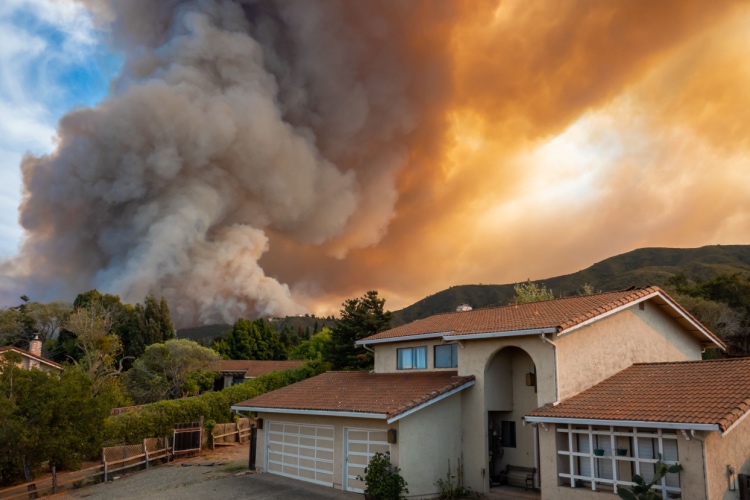
When a disaster strikes, seniors often face more challenges than younger adults. Mobility issues, medical conditions, and difficulty accessing real-time updates can make evacuations and emergency responses more complicated. That’s why having a solid plan in place is so important.
California is no stranger to natural disasters. The recent wildfires have left many displaced and struggling to rebuild, and the upcoming months bring new risks—floods, earthquakes, and even more wildfires. For older adults, being informed and prepared isn’t just about safety—it’s about peace of mind.
Table of Contents
- California Natural Disasters
- How to Stay Informed Before and During a Disaster
- Creating a Personalized Emergency Plan
- Staying Mentally and Emotionally Strong During a Disaster
- Staying Connected and Supported After a Disaster
- How Blue Moon Senior Counseling Can Help
- FAQ
California Natural Disasters
Wildfires
This year, California has already seen devastating wildfires that have destroyed homes and entire communities. Fire season is lasting longer than ever, and experts predict more fires in the coming months due to dry conditions and high winds.
Flooding and Mudslides
After a wildfire, burned land can’t absorb water as it used to. That means areas recently hit by fires are at high risk for flash floods and mudslides, even with just moderate rainfall. Seniors who live near wildfire zones should be aware of this additional risk and take precautions.
Earthquakes
Unlike wildfires and storms, earthquakes happen without warning. Many experts predict California is due for a major quake soon. The best way to stay safe is by preparing ahead of time—knowing what to do when the ground starts shaking can make all the difference.
Extreme Heat
Rising temperatures are another growing threat. Seniors are more vulnerable to heat exhaustion and heat stroke, and power outages during heatwaves can make it harder to stay cool.
Disasters can happen at any time, but the more prepared you are, the safer you’ll be.
Creating a Personalized Emergency Plan
Evacuation Plans
If an evacuation order is given, don’t wait—seniors need extra time to evacuate safely. Here’s what to do:
- Know two evacuation routes in case one is blocked.
- Arrange transportation ahead of time if you don’t drive.
- Keep important documents (ID, insurance, medication list) in a waterproof bag.
- If you have pets, make sure your evacuation plan includes them.
Emergency Supplies
Put together an emergency kit with:
- Enough water and food for at least 3 days
- Flashlights and extra batteries
- A battery-powered or hand-crank radio
- First-aid kit
- Backup glasses, hearing aids, or mobility devices
- Cash (since ATMs may not work)
Medical Needs
- Keep extra medications on hand in case pharmacies are closed.
- Have a backup power source for medical devices (oxygen, CPAP, etc.).
- Carry a list of your medical conditions and doctor’s contact info.
Having a plan means fewer decisions in a crisis and more confidence when disaster strikes.
Staying Mentally and Emotionally Strong During a Disaster
Disasters don’t just affect physical safety—they take an emotional toll, too. Many seniors feel anxiety, depression, or PTSD after experiencing wildfires, evacuations, or other disasters.
Tips to Protect Your Mental Well-Being
- Talk About Your Feelings – Bottling up fear or stress can make it worse. Share your worries with a loved one or a counselor.
- Stay Connected – Even if you’re displaced, keep in touch with family and friends. A simple phone call can be grounding.
- Stick to a Routine – Even in an evacuation shelter or temporary housing, try to maintain normal habits, like reading in the morning or taking a short walk.
- Limit News Exposure – While staying informed is important, constant exposure to disaster coverage can increase anxiety. Check updates periodically, but don’t let it take over your day.
Staying Connected and Supported After a Disaster
Disasters don’t just disrupt daily life—they can also leave seniors feeling isolated, disconnected, and unsure of where to turn for help. Whether it’s temporary displacement, loss of community resources, or the emotional toll of seeing familiar places destroyed, staying socially and emotionally connected is crucial.
Why Social Connection Matters
When a disaster happens, it’s easy to focus on physical survival—evacuation, supplies, and shelter. But emotional well-being is just as important. Loneliness and isolation can make post-disaster recovery harder, especially for older adults. Having people to talk to and rely on can help reduce stress, ease anxiety, and provide a sense of normalcy.
Ways to Stay Connected and Get Support
- Check In With Family and Friends
Even if you don’t live near family, staying in touch reminds you that you’re not alone. If phone lines are down, text messages or social media may work. Let loved ones know where you are and how you’re doing.
- Join a Local Senior or Disaster Support Group
Many communities have senior centers, church groups, or neighborhood networks that offer support during and after disasters. These groups can help with:
- Transportation assistance
- Meal delivery
- Emotional support and companionship
- Disaster recovery resources
Check with local senior organizations, city emergency management offices, or community centers to find available support.
- Reconnect With Your Routine as Soon as Possible
After a disaster, life might feel completely out of control. Finding ways to return to familiar routines can be grounding.
- If you enjoy reading, pick up a book or listen to an audiobook.
- If you like gardening, see if you can start small, even if it’s just tending to potted plants.
- If you went on daily walks, try to get outside when it’s safe.
These small actions rebuild a sense of normalcy, even in uncertain times.
- Take Advantage of Disaster Relief Services
There are many disaster assistance programs for relief. These services can help with housing, medical needs, and financial support after a wildfire, flood, or earthquake.
- FEMA Disaster Assistance – Offers temporary housing, financial aid, and recovery resources.
- American Red Cross – Provides shelter, meals, and emotional support.
- California Department of Aging (CDA) – Has programs to assist seniors with emergency relief.
If you’re not sure where to start, ask a trusted friend or family member counselor to help you apply.
How Blue Moon Senior Counseling Can Help
If you’re feeling overwhelmed, anxious, or emotionally drained due to recent disasters, we’re here for you. Blue Moon Senior Counseling helps older adults navigate trauma, stress, and the emotional impact of life-changing events.
Our licensed therapists provide:
- One-on-one counseling to help process emotions
- Stress management strategies to build resilience
- Grief and trauma support for those who’ve lost homes, pets, or loved ones
Your safety—both physical and emotional—matters. If you’re feeling overwhelmed, know that Blue Moon Senior Counseling is here to help. Contact us today to find support and peace of mind in uncertain times.
Frequently Asked Questions
- What’s the most important thing seniors can do to prepare for a disaster?
Having an evacuation plan and an emergency kit is critical. Knowing where you’ll go and having supplies ready can save time and stress.
- How can I get real-time wildfire and disaster alerts?
Sign up for Wireless Emergency Alerts (WEA), follow Cal Fire and California OES, and keep a NOAA Weather Radio for updates.
- I have mobility issues—what should I do in an emergency?
Plan ahead by arranging evacuation assistance with neighbors or emergency services. If needed, sign up for local emergency registries that assist seniors during disasters.
- How can I manage anxiety and fear about future disasters?
Having a plan can ease anxiety. Also, talking with a counselor can help you work through disaster-related stress in a healthy way.
- Can therapy really help with disaster-related stress?
Absolutely. Disaster-related trauma can be long-lasting, but counseling provides tools to manage stress, process fear, and regain a sense of control.








